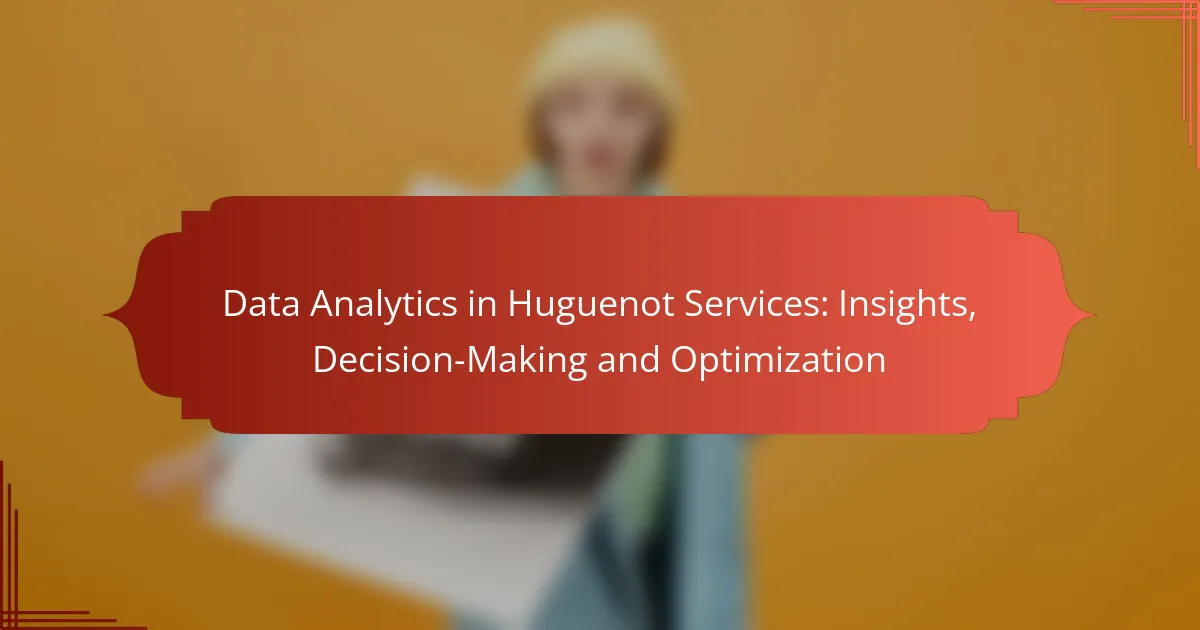Data analytics plays a crucial role in enhancing Huguenot services in Ireland by providing actionable insights that improve customer experiences and streamline operations. By leveraging advanced tools for data visualization and reporting, organizations can make informed decisions that optimize service delivery and resource allocation, ultimately driving growth and efficiency.
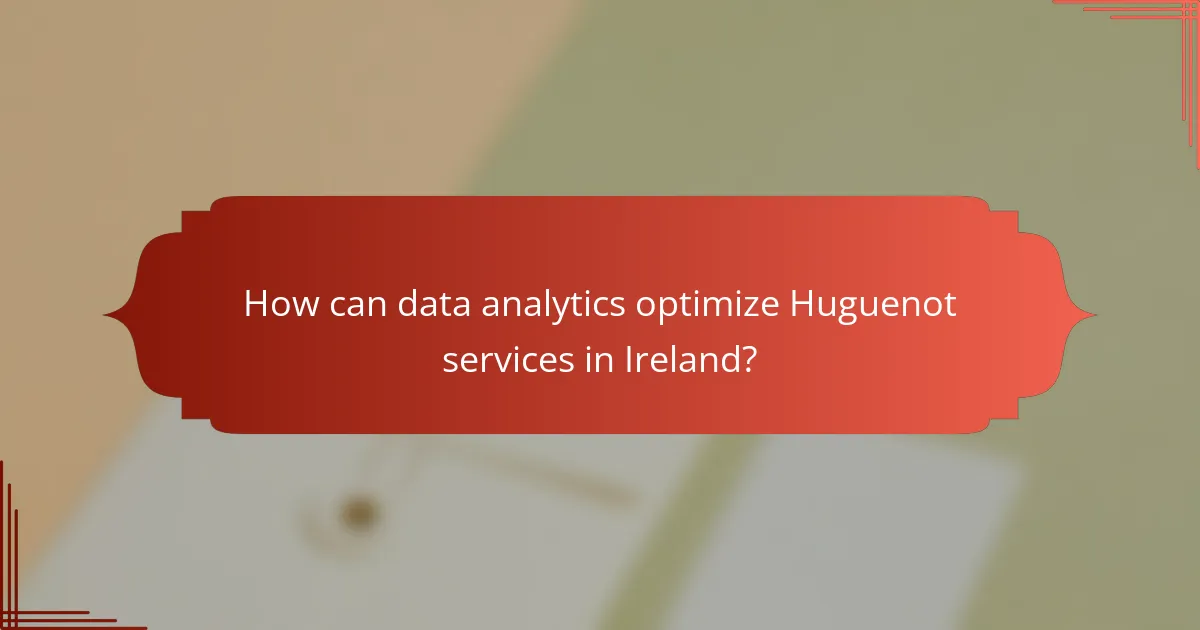
How can data analytics optimize Huguenot services in Ireland?
Data analytics can significantly enhance Huguenot services in Ireland by providing actionable insights that lead to improved customer experiences and streamlined operations. By leveraging data, organizations can make informed decisions that optimize service delivery and resource allocation.
Improved customer insights
Data analytics allows Huguenot services to gather and analyze customer feedback, preferences, and behaviors. By utilizing surveys, social media interactions, and service usage data, organizations can develop a clearer understanding of their clientele.
For example, tracking customer satisfaction scores can help identify areas needing improvement, leading to targeted enhancements in service offerings. This approach not only boosts customer loyalty but also attracts new clients through positive word-of-mouth.
Enhanced operational efficiency
Utilizing data analytics can streamline operations within Huguenot services by identifying inefficiencies and optimizing resource allocation. By analyzing workflow patterns and service delivery times, organizations can pinpoint bottlenecks and implement solutions to enhance productivity.
For instance, predictive analytics can forecast demand for services, enabling better staff scheduling and inventory management. This proactive approach minimizes downtime and maximizes service availability, ultimately improving overall efficiency.
Data-driven decision making
Data-driven decision making empowers Huguenot services to base their strategies on empirical evidence rather than intuition. By employing analytical tools, organizations can evaluate the effectiveness of various initiatives and make adjustments accordingly.
For example, A/B testing different service approaches can reveal which methods yield better customer engagement. This iterative process fosters a culture of continuous improvement, ensuring that services remain relevant and effective in meeting client needs.
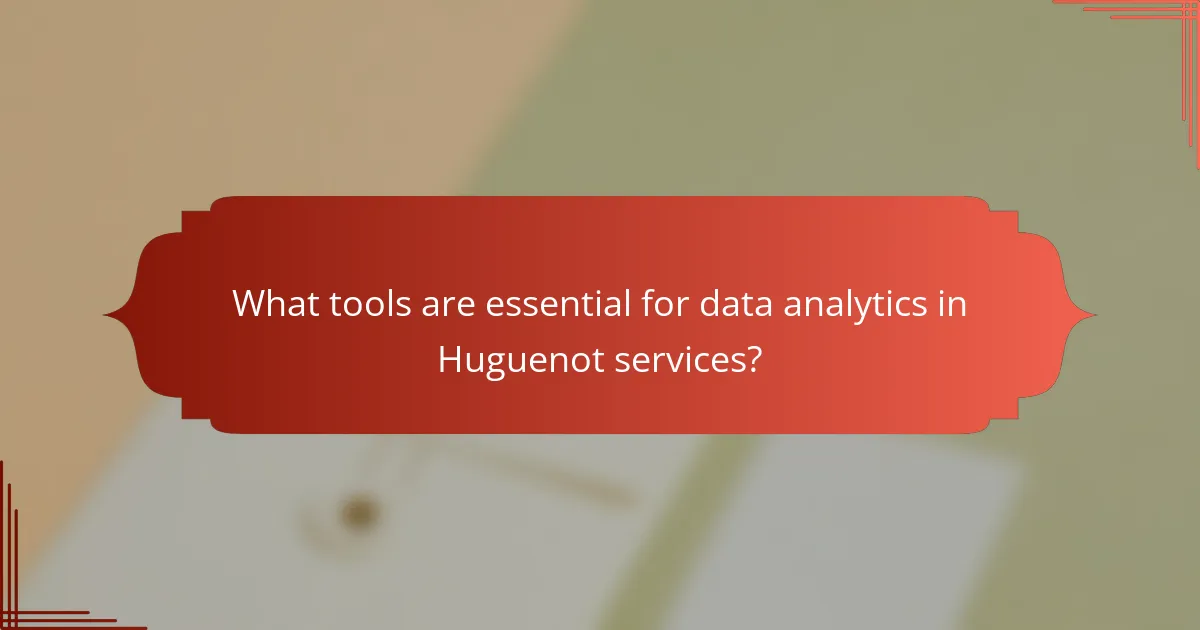
What tools are essential for data analytics in Huguenot services?
Essential tools for data analytics in Huguenot services include software that enhances data visualization, web insights, and reporting capabilities. Utilizing the right tools can significantly improve decision-making and operational efficiency.
Tableau for data visualization
Tableau is a powerful tool for data visualization that allows Huguenot services to create interactive and shareable dashboards. It transforms raw data into visually appealing graphics, making it easier to identify trends and patterns.
When using Tableau, focus on integrating data from various sources to provide a comprehensive view. Consider using features like filters and drill-downs to enhance user engagement and insight depth.
Google Analytics for web insights
Google Analytics is crucial for gathering web insights, helping Huguenot services understand user behavior on their websites. This tool tracks metrics such as page views, session duration, and user demographics, enabling data-driven decisions.
To maximize Google Analytics, set up goals and conversion tracking to measure the effectiveness of campaigns. Regularly review the data to adapt strategies based on user engagement and traffic sources.
Power BI for reporting
Power BI is an effective reporting tool that allows Huguenot services to compile and analyze data from multiple sources. It provides real-time insights through interactive reports and dashboards, facilitating informed decision-making.
When implementing Power BI, focus on creating clear, concise reports that highlight key performance indicators (KPIs). Utilize its sharing capabilities to ensure stakeholders have access to the latest data for strategic planning.
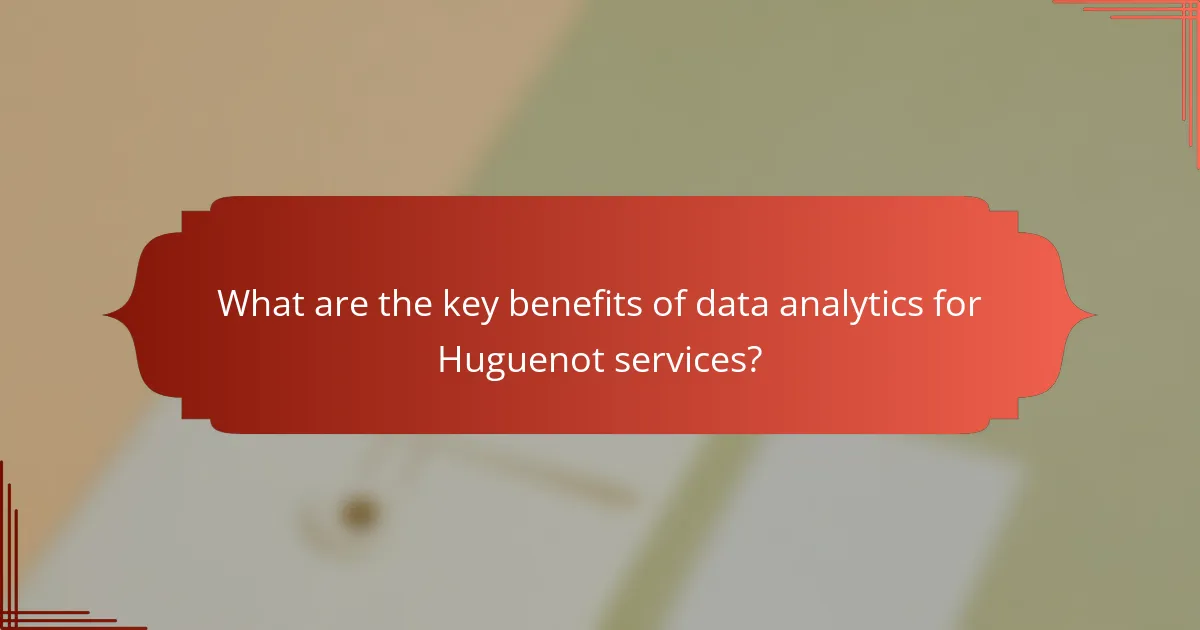
What are the key benefits of data analytics for Huguenot services?
Data analytics offers significant advantages for Huguenot services by enhancing decision-making, optimizing operations, and uncovering insights that drive growth. By leveraging data, organizations can identify trends, improve efficiency, and ultimately deliver better services to their clients.
Increased revenue opportunities
Data analytics can reveal new revenue streams for Huguenot services by identifying customer preferences and market trends. For instance, analyzing client data might uncover a demand for specific services that are currently underoffered, allowing businesses to tailor their offerings accordingly.
Additionally, predictive analytics can help forecast future sales based on historical data, enabling organizations to make informed decisions about resource allocation and marketing strategies. This proactive approach can lead to increased sales and improved profitability.
Better resource allocation
Effective data analytics allows Huguenot services to optimize resource allocation by identifying which areas require more investment and which are underperforming. By analyzing operational data, organizations can determine the most efficient use of staff, equipment, and budget.
For example, if data shows that certain services are consistently more profitable, resources can be redirected to enhance those offerings. This strategic allocation can minimize waste and maximize returns, ensuring that every dollar spent contributes to the organization’s goals.
Improved customer satisfaction
Utilizing data analytics can significantly enhance customer satisfaction for Huguenot services by providing insights into client needs and preferences. By analyzing feedback and service usage patterns, organizations can tailor their services to better meet customer expectations.
Moreover, data-driven insights can help in personalizing communication and service delivery, creating a more engaging customer experience. For instance, targeted promotions based on customer behavior can lead to higher engagement and loyalty, ultimately resulting in a more satisfied client base.
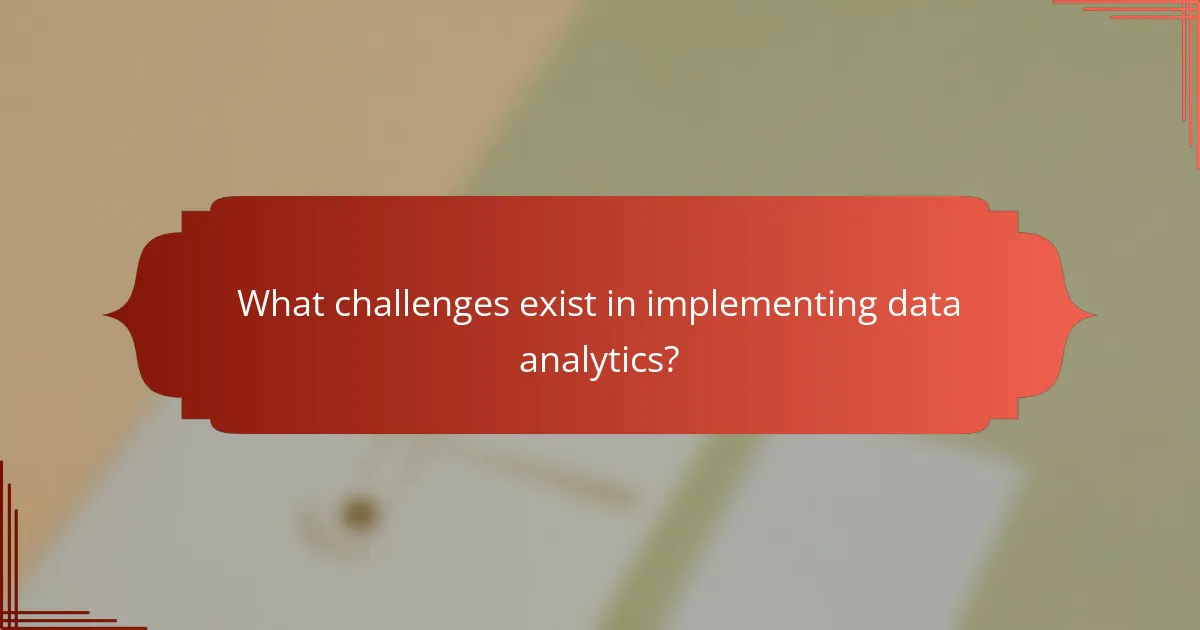
What challenges exist in implementing data analytics?
Implementing data analytics in Huguenot services presents several challenges that can hinder effective use. Key issues include data privacy concerns, integration with existing systems, and skill gaps within the workforce.
Data privacy concerns
Data privacy is a significant challenge when implementing data analytics, particularly in sectors handling sensitive information. Organizations must comply with regulations such as GDPR, which mandates strict guidelines on data collection and usage.
To address these concerns, businesses should establish clear data governance policies and ensure transparency in how data is collected and analyzed. Regular audits and employee training on data privacy can further mitigate risks.
Integration with existing systems
Integrating data analytics tools with existing systems can be complex and resource-intensive. Legacy systems may not support modern analytics solutions, leading to potential data silos and inefficiencies.
To facilitate smoother integration, organizations should assess their current infrastructure and invest in compatible analytics platforms. A phased approach to integration can help minimize disruptions and allow for gradual adaptation.
Skill gaps in workforce
Many organizations face skill gaps in their workforce, making it difficult to effectively implement and utilize data analytics. Employees may lack the necessary training in data interpretation, statistical analysis, or the use of analytics software.
To bridge these gaps, companies should invest in training programs and workshops focused on data analytics skills. Partnering with educational institutions or offering online courses can also help build a more competent workforce in this area.
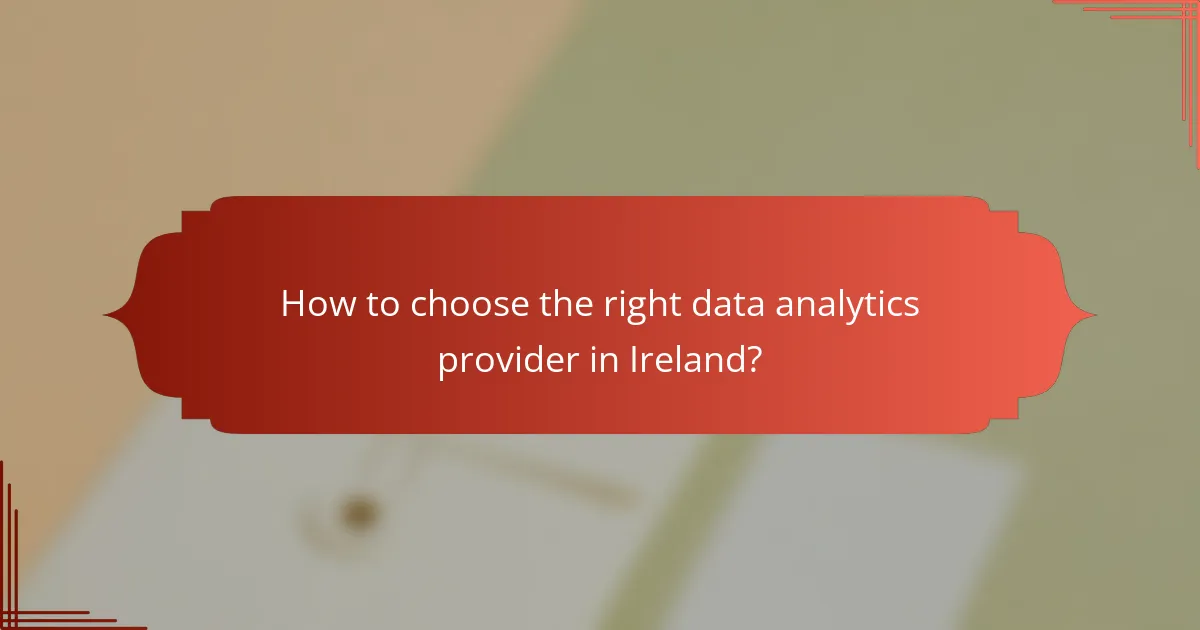
How to choose the right data analytics provider in Ireland?
Choosing the right data analytics provider in Ireland involves evaluating their expertise, technology, and pricing to ensure they meet your specific needs. Consider their experience in your industry, how well their technology integrates with your systems, and the affordability of their services.
Evaluate industry experience
Assessing the industry experience of a data analytics provider is crucial. Look for companies that have a proven track record in your sector, as they will better understand your unique challenges and requirements. A provider with relevant experience can offer tailored solutions that drive effective decision-making.
Request case studies or references from similar businesses to gauge their success and reliability. This will help you identify providers who have successfully implemented analytics solutions in your industry.
Assess technology compatibility
Technology compatibility is essential when selecting a data analytics provider. Ensure that their tools and platforms can seamlessly integrate with your existing systems, such as CRM or ERP software. This compatibility will facilitate smoother data flow and enhance overall efficiency.
Consider providers that utilize widely accepted technologies and standards. This reduces the risk of future compatibility issues and ensures that you can easily adapt to evolving analytics trends.
Consider pricing models
Understanding the pricing models of data analytics providers is key to making an informed choice. Many providers offer various pricing structures, such as subscription-based, pay-per-use, or project-based fees. Evaluate which model aligns best with your budget and expected usage.
Be cautious of hidden fees or long-term contracts that may complicate your financial planning. Request a clear breakdown of costs and consider negotiating terms that provide flexibility as your analytics needs evolve.
